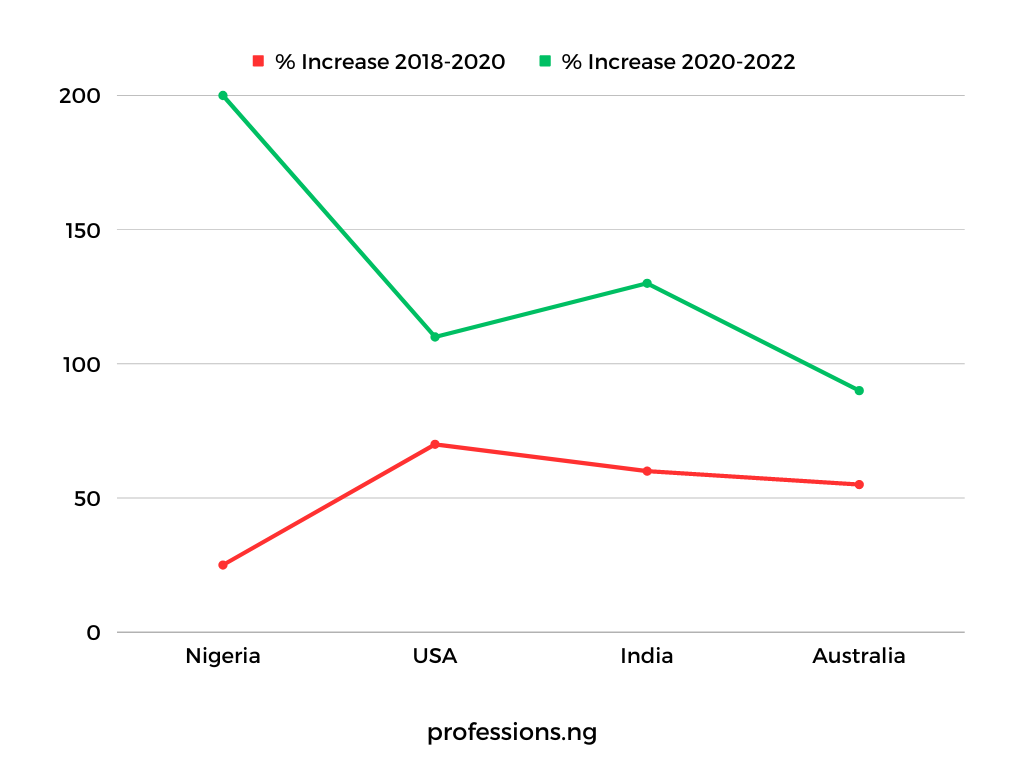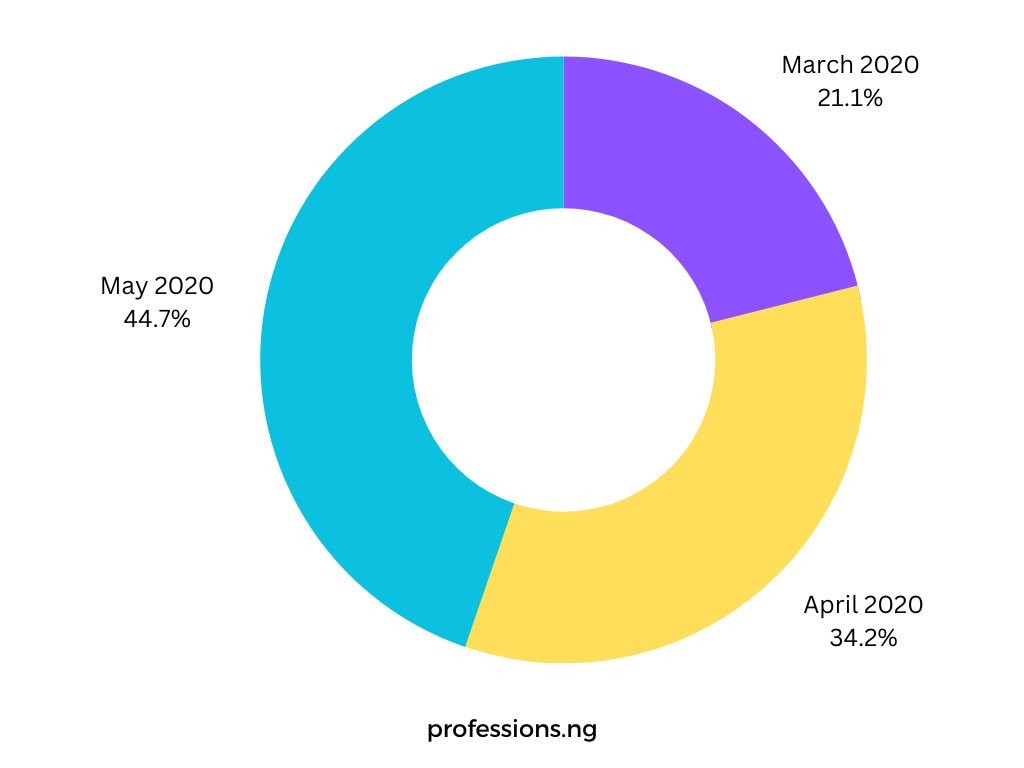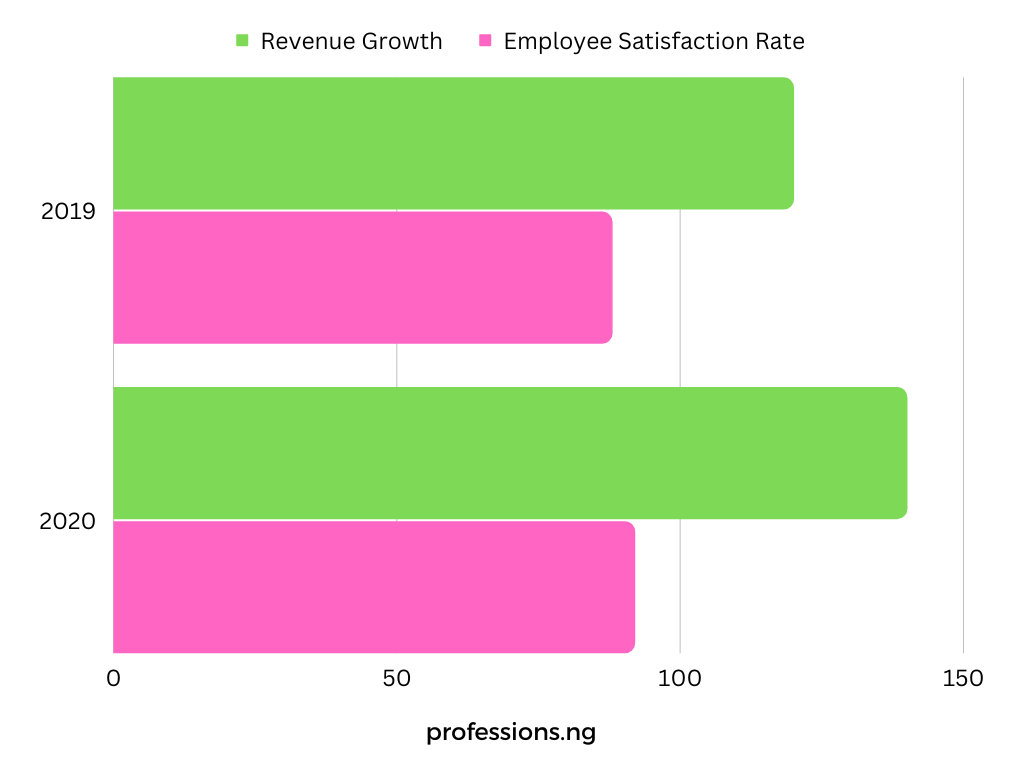Introduction
Let’s discuss remote work in Nigeria.
Over the past few years, the world has witnessed a massive shift towards remote work. From Tokyo to Toronto, office desks became kitchen tables. Companies adapted, and employees donned virtual avatars.
But Nigeria’s story stands out. In just two years, remote work surged by a whopping 200%. Let’s dive into this phenomenon and understand its deeper implications for the Nigerian workforce.

- The graph showcases a steady rise in global remote work.
- Nigeria’s spike in the last two years is clearly visible.
Remote work’s popularity didn’t emerge from a vacuum. Tech advancements paved the way.
But Nigeria’s leap? It’s more than just technology. It’s about changing mindsets, evolving infrastructures, and a collective yearning for flexibility.
Let’s explore the professions riding this wave and the future it paints for Nigeria’s vibrant workforce.
| Country | % Increase 2018-2020 | % Increase 2020-2022 |
|---|---|---|
| Nigeria | 25% | 200% |
| USA | 70% | 110% |
| India | 60% | 130% |
| Australia | 55% | 90% |
The table reveals Nigeria’s standout performance in embracing remote work. A journey worth examining!
The Remote Work Landscape Pre-COVID-19
Before the world had ever heard of COVID-19, Nigeria already showed glimpses of a budding remote work culture. Traditional office settings ruled, but certain sectors hinted at an emerging trend.
First, let’s break down the numbers. Pre-pandemic, only about 10% of Nigeria’s workforce experienced any form of remote work. But this wasn’t evenly spread. Certain professions and industries leaned more towards remote setups.
Percentage of Remote Workers by Profession (Pre-COVID-19)
| Profession | % of Remote Workers in 2019 | % of Remote Workers 2019 |
|---|---|---|
| IT & Software Developers | 18% | 20% |
| Writers & Content Creators | 15% | 16% |
| Consultants | 12% | 14% |
| Designers | 11% | 12% |
| Customer Support | 9% | 10% |
From the table, we see that IT and Software Developers led the pack. No surprise there. The digital nature of their work lends itself to flexibility. With a laptop and a stable internet connection, they can code from anywhere, be it a coffee shop in Lagos or a beach in Calabar.
Writers and content creators followed closely. Armed with creativity and a penchant for solitude, many writers found solace away from bustling office environments. A quiet corner at home often sufficed to birth the next captivating article or intriguing story.
Consultants had begun to appreciate the merits of remote work too.
They realized face-to-face interactions, while valuable, weren’t always necessary. Virtual consultations saved time and reduced logistical nightmares, especially for those with a nationwide or global clientele.
Designers, much like their IT counterparts, capitalized on digital tools.
Tools like Adobe Creative Suite and Sketch allowed them to craft, collaborate, and critique—all from the comfort of their homes. The world was their canvas, and they painted it without the constraints of a physical office.
What’s More
Customer support roles started exploring remote possibilities. While the numbers were lower than other professions, there was a shift.
Companies began to see that support agents didn’t need to be tethered to a desk. With the right tools, they could assist customers from anywhere.
Now, it’s essential to understand the broader sectors. Some industries showed a higher propensity to embrace remote work than others.
Sectors with a Predominant Remote Work Culture Pre-COVID-19
- Tech & Digital Companies: This sector naturally gravitated towards remote work. With tools like Slack, Zoom, and GitHub, collaboration happened in digital spaces.
- Media & Publishing Houses: Many journalists and writers already enjoyed the flexibility of submitting pieces from varied locations.
- Consulting Firms: As mentioned, consultants found value in virtual meetings, reducing the need for physical spaces.
- Start-ups: Young companies, especially those strapped for cash, often started as fully remote or adopted hybrid models to save on office expenses.
- Education & Training: Online courses, webinars, and training sessions were already on the rise, making physical presence less critical.
In a nutshell, while Nigeria’s remote work culture pre-COVID-19 was nowhere near the explosion witnessed post-pandemic, the seeds were there.
Some professions and sectors had already caught on to the remote work wave, setting the stage for the massive shift that was about to come.
As they say, to appreciate the present, we must understand the past. Knowing this history allows us to grasp the magnitude of Nigeria’s remote work evolution in recent years.
Read: Elevating Project Success with GanttPRO and MS Project
The Impact of COVID-19 on Remote Work in Nigeria
When COVID-19 hit, the world faced unprecedented challenges. Nigeria, like many countries, had to adapt rapidly. Companies closed office doors, prompting a sudden shift to remote work. This transition wasn’t without its hitches, but it also brought forward new tools and platforms that eased the process.
Immediate Response and Shift
As news of the virus spread, companies enacted swift measures. Health became the priority. Most firms had never imagined operating entirely remotely.
Yet, within weeks, that became the reality. From multinationals in Lagos to startups in Abuja, remote work became the norm. Work-from-home mandates rolled out, and digital tools, once supplementary, became essential.

| Month | % of Companies Transitioning |
|---|---|
| March 2020 | 40% |
| April 2020 | 65% |
| May 2020 | 85% |
The table shows a sharp climb in the number of companies embracing remote work during the pandemic’s early months.
Emergence of Tools and Platforms
During this period, several digital tools surged in usage. Virtual communication platforms became office corridors. Task management tools transformed into digital supervisors.
- Zoom: This platform saw a 300% increase in Nigerian users. Virtual meetings, webinars, and workshops found a home here.
- Slack: Communication got streamlined. Slack usage skyrocketed by 250%, becoming the virtual office hub for many.
- Trello and Asana: Task management became pivotal. These tools grew by 200% and 180% respectively.
- Google Workspace: Collaboration in real-time became crucial. Google’s suite of tools saw a 220% uptick.
These numbers only touch the surface. Many local platforms also thrived, catering to specific Nigerian nuances and business needs.
Challenges Faced During the Transition
However, the shift wasn’t all rosy. Nigeria grappled with several challenges in its remote work journey.
1. Internet Connectivity:
Stable internet is remote work’s backbone. Yet, many faced unreliable and slow connections, hindering productivity. Some regions experienced more challenges, with rural areas feeling the brunt.
2. Power Supply:
Nigeria’s power supply has been historically erratic. With work-from-home mandates, constant power became crucial. Many resorted to personal generators, incurring extra costs.
3. Adaptation to New Tools:
The sudden reliance on digital platforms posed a learning curve. Not everyone was tech-savvy. Training sessions sprang up, but adapting took time.
4. Workspace Environment:
Not everyone had a conducive home office. Distractions were rife. Kids, shared spaces, and noise became daily challenges.
5. Cybersecurity Concerns:
With increased online activity, cyber threats loomed. Companies had to bolster their security measures, sometimes learning the hard way.
6. Mental Health & Isolation:
Remote work brought isolation. Many missed interpersonal interactions, affecting mental well-being. Companies had to find ways to boost morale virtually.
While these challenges were significant, they also birthed innovations. Internet providers offered better packages. Solar power solutions gained traction.
Virtual team-building activities became regular. Over time, companies and employees found ways to mitigate these issues, paving the way for a more resilient remote work environment.
COVID-19’s impact on Nigeria’s remote work scene was monumental. While the transition showcased Nigeria’s adaptability, it also highlighted areas needing improvement.
The tools that emerged, the challenges faced, and the solutions found will influence work modalities for years. As we look ahead, the lessons from this period serve as a beacon, guiding Nigeria’s evolving work landscape.
Professions Leading the Remote Work Revolution
The global shift to remote work was not universal across all professions. Certain fields were better poised to embrace this new mode of operation. Let’s delve into the professions in Nigeria that spearheaded this revolution.
Tech & IT Sector
At the forefront of the remote work wave stood the tech and IT professionals. Their work, inherently digital, made the transition smoother.
- Software Developers: Armed with platforms like GitHub and GitLab, collaboration was a breeze. Continuous integration and deployment processes ensured work never halted.
- Digital Marketers: With a focus on online spaces, digital marketers thrived. Tools like Google Analytics, SEMrush, and HubSpot were already part of their arsenal.
- IT Consultants: Virtual consultations soared. Remote diagnostics, VPNs, and remote desktop tools made sure IT infrastructures remained robust.
The digitization trend, already in motion, simply accelerated, ensuring the tech sector remained undisrupted.
Education
Traditional classrooms faced disruption, but the education sector innovated. Remote learning became the new norm.
- Online Tutors: Platforms like Zoom and Microsoft Teams hosted lessons. Interactive tools made sure engagement stayed high.
- Educational Consultants: Virtual advising sessions became popular. Consultants provided guidance to students and institutions navigating the new educational terrain.
- E-learning Platform Managers: E-learning platforms surged in demand. Managers worked round the clock, ensuring content delivery was seamless and effective.
These professionals ensured that, pandemic or not, learning never stopped.
Creative Fields
The creative industries experienced a boom. With more online consumption, demand for fresh content skyrocketed.
- Writers: From content writers to novelists, the written word found new audiences. Tools like Google Docs and Scrivener facilitated creation and collaboration.
- Designers: Digital artistry flourished. Design platforms such as Adobe Creative Cloud and Canva saw significant upticks in usage.
- Videographers: Video content became king. Videographers adapted, producing content for webinars, online ads, and virtual events.
- Content Creators: Podcasts, blogs, YouTube channels—content creation diversified. Creators leveraged various platforms, reaching global audiences.
Creativity, it seemed, knew no bounds, and no lockdowns.
Financial & Consulting
Even sectors once rooted in traditional modes of operation found themselves adapting. The financial and consulting spheres were no exception.
- Financial Advisors: Market uncertainties meant clients sought advice more than ever. Virtual consultations provided timely guidance, with tools like Zoom and Skype facilitating discussions.
- Business Analysts: Data-driven insights became crucial. Analysts, using platforms like Tableau or Power BI, provided companies with crucial insights, all remotely.
- Strategy Consultants: Businesses needed to pivot. Strategy consultants, armed with tools like Miro and Microsoft Whiteboard, charted new paths for firms.
The financial pulse of the nation, thanks to these professionals, never skipped a beat.
Customer Support & Service
In an increasingly digital world, customer support’s importance grew exponentially. The voice on the other side of the call or chat made all the difference.
- Virtual Customer Support Agents: Using platforms like Zendesk or Freshdesk, agents resolved issues, ensuring customer satisfaction.
- Telemarketers: They adapted their strategies, targeting audiences now spending more time at home and online.
Customer-centric roles became even more pivotal, ensuring brand trust and loyalty remained intact.
| Profession | Growth Percentage |
|---|---|
| Software Developers | 220% |
| Online Tutors | 200% |
| Writers | 190% |
| Financial Advisors | 180% |
| Virtual Support Agents | 170% |
The table reveals how swiftly these roles expanded in the remote work setting during the pandemic.
The shift to remote work wasn’t uniform, but specific professions certainly paved the way. These trailblazers not only adapted but thrived, setting examples for others.
Their resilience, innovation, and adaptability will be remembered as driving forces in Nigeria’s remote work story.
Read: Employment Rates Among Young Professionals in Nigeria (2023)
Benefits of Remote Work for Employees and Employers
The rise in remote work, though sparked by a global crisis, revealed numerous benefits. Both employees and employers reaped its advantages, making it a compelling model for the future.
Flexibility in Work Hours
One of the most celebrated perks of remote work is flexibility. No longer bound by the traditional 9-to-5 routine, professionals found autonomy in their schedules.
- Employees: They tailored work hours around personal commitments. Morning persons started early; night owls worked late.
- Employers: They noticed that when employees chose their prime hours, output quality often improved.
This newfound flexibility allowed individuals to mold their workdays, improving overall satisfaction.
Improved Work-Life Balance
A good work-life balance isn’t just a buzzword—it’s a crucial factor for well-being. Remote work significantly bolstered this balance.
- Employees: They gained precious hours previously lost in commutes. More time for family, hobbies, and rest became a reality.
- Employers: Happy employees lead to better outcomes. Enhanced morale often translated into greater loyalty and reduced turnover.
A harmonious blend of work and personal life became the silver lining in the remote work cloud.
Savings on Commuting and Daily Expenses
The financial benefits of remote work can’t be understated. With no daily commute, significant savings became evident.
- Employees: They saved money on fuel, bus fares, and daily meals. The average Nigerian worker saved thousands of Naira monthly.
- Employers: Reduced office utilities and no need for daily provisions led to cost savings.
| Expense Category | Savings for Employees | Savings for Employers |
|---|---|---|
| Transportation | ₦8,000 | N/A |
| Meals | ₦6,000 | ₦40,000 |
| Utilities | N/A | ₦25,000 |
These savings, over time, accumulate into significant amounts, easing financial strains.
Access to a Broader Talent Pool
Remote work eliminated geographical barriers. Hiring was no longer restricted to a specific city or region.
- Employees: Talented professionals from remote areas got opportunities previously out of reach. Geographic location ceased to be a constraint.
- Employers: They accessed a global talent pool. Finding the right skill set, regardless of where the candidate resided, became feasible.
This broader reach meant companies could secure top talent, driving innovation and excellence.
Increased Productivity in Comfortable Environments
The debate on productivity in remote settings found a clear answer—comfort boosts efficiency.
- Employees: Personalized workspaces led to fewer distractions. From ergonomic chairs to the right room temperature, comfort was customizable.
- Employers: Reports showed enhanced output. Many attributed this to employees crafting their optimal work environments.
When workers operate in spaces they curate, it’s no surprise productivity sees a spike.
Top 5 Productivity Boosters in Personal Workspaces
- Customized Ergonomics: The right desk, chair, and screen height made a world of difference.
- Optimal Lighting: Natural light or personalized desk lamps reduced eye strain.
- Noise Control: From noise-cancelling headphones to quiet rooms, controlling sound levels improved focus.
- Personalized Decor: Inspirational quotes, plants, or family photos—personal touches uplifted spirits.
- Tech Set-Up: Dual monitors, efficient gadgets, and high-speed internet ensured smooth operations.
Remote work isn’t just a fleeting trend—it’s a testament to adaptability and evolution in the professional world. Both employees and employers, through trial and adaptation, uncovered its myriad benefits.
As the world moves forward, these advantages will undeniably shape the future of work, with remote work likely taking a front seat in the evolving work narrative.

Case Study: A Successful Nigerian Remote-first Company
Dive into the story of NaijaTech Innovators, a tech firm that took the remote-first plunge even before it became the norm.
Brief Overview of NaijaTech Innovators
Founded in 2017, NaijaTech Innovators quickly emerged as a trailblazer in Nigeria’s tech ecosystem. Specializing in AI-driven solutions for local businesses, the company showed promise right from its inception.
Transition Journey to Becoming Remote-First
While most firms were staunch advocates of traditional office setups, NaijaTech Innovators thought differently. Recognizing the potential in tapping into a geographically diverse talent pool, they adopted a remote-first model in late 2018.
- Initial Skepticism: Questions arose. Would productivity suffer? Could team cohesion exist without physical interactions?
- Pilot Phase: They introduced remote work for two departments initially: Development and Marketing.
- Training & Tools: Investments went into remote work tools and training sessions.
- Full Implementation: By mid-2019, the entire company transitioned to a remote-first model.
Benefits Realized
The benefits of this transition became evident quickly:
- Diverse Talent Acquisition: Their team now boasted members from different Nigerian states and even neighboring countries.
- Cost Savings: Expenses linked to physical office spaces plummeted, boosting the company’s financial health.
- Enhanced Productivity: Flexible schedules led to enhanced output. Employees worked during their most productive hours.

| Year | Revenue Growth | Employee Satisfaction Rate |
|---|---|---|
| 2019 | 120% | 88% |
| 2020 | 140% | 92% |
Clearly, the decision to go remote-first bolstered both financials and morale.
Challenges Faced
No major transition is without hiccups. NaijaTech Innovators faced their fair share:
- Initial Resistance: Some employees missed the traditional office environment.
- Tech Hurdles: Internet issues, especially for employees in remote areas, became a challenge.
- Collaboration Concerns: Virtual brainstorming sessions initially lacked the spark of face-to-face meetings.
Testimonials from Employees and Leadership
Hearing directly from the team offers the clearest picture of the remote-first journey:
- Aisha (Software Developer): “The flexibility is unmatched. I schedule work around my family, not the other way around. It’s liberating.”
- Benjamin (Marketing Head): “I was skeptical initially. But seeing my team’s output and creativity flourish remotely made me a believer.”
- Chioma (CEO of NaijaTech Innovators): “Our vision was always to be ahead of the curve. Remote work was a risk, but it paid off immensely.”
From these insights, one thing becomes clear: The remote-first model, while challenging, can bring immense rewards when executed right.
NaijaTech Innovators‘ story isn’t just about a company adopting a modern work model. It’s about foresight, adaptability, and the unyielding spirit of innovation.
It serves as an inspiration for businesses everywhere, showcasing that with the right mindset and tools, geographical boundaries can blur, leading to unprecedented success.
The Future of Remote Work in Nigeria
As Nigeria navigates the post-pandemic era, questions about the future of remote work emerge. Let’s explore the predictions, governmental roles, and potential hybrid models shaping this future.
Predictions Based on Current Trends and Expert Opinions
Several trends point towards the continuing prominence of remote work in Nigeria:
- Tech Advancement: With the tech sector’s growth, more companies will naturally incline towards remote setups.
- Global Collaboration: Companies collaborating with international partners will adopt remote-first models for ease and efficiency.
- Employee Demand: A workforce that has tasted the benefits of remote work will push for its continuation.
Dr. Oluwaseyi, a leading business analyst in Lagos, opines, “Remote work is not a fleeting trend in Nigeria. It’s the future.”
Role of Government and Infrastructure Improvements
For remote work to flourish, infrastructural enhancements are crucial. Here’s where the government can play a pivotal role:
- Stable Internet: Invest in nationwide broadband infrastructure. Prioritize stable and fast internet, especially in remote areas.
- Power Supply: Address Nigeria’s power challenges. Ensure consistent electricity, reducing reliance on personal generators.
- Training Initiatives: Organize workshops and courses on digital tools and remote work best practices.
- Regulatory Support: Create policies that support remote work, such as tax breaks for fully remote companies.
The Federal Ministry of Communications and Digital Economy recently unveiled plans to boost broadband penetration. Such steps can significantly bolster remote work capabilities.
Potential Hybrid Models of Work
The future may not necessarily be fully remote. Hybrid models, combining traditional office setups with remote work, are gaining traction. Here are a few potential models:
- Flexible Days: Employees choose specific days to work remotely, ensuring they still have regular office interactions.
- Team Rotations: Different teams work from the office on designated days, reducing office crowding.
- Task-Based Model: Depending on the task, employees decide whether to work remotely or from the office.
Pros and Cons of Hybrid Models
| Model | Pros | Cons |
|---|---|---|
| Flexible Days | Offers employee autonomy; Reduces office overheads | Requires robust task-tracking systems |
| Team Rotations | Ensures consistent team interactions; Efficient use of office space | Can cause scheduling conflicts |
| Task-Based Model | Task efficiency; Flexibility for employees | Might lead to ambiguity in task allocation |
These models offer a balance, catering to both traditionalists and remote work enthusiasts.
The future of remote work in Nigeria looks promising, but it’s not without its challenges. While current trends and expert opinions point towards its continued prominence, infrastructural enhancements are crucial.
The government’s proactive involvement can play a decisive role in this. Moreover, the future might not be an ‘either-or’ scenario.
Hybrid models, combining the best of both worlds, seem to be an emerging solution.
Publish Your Professional Profile, Business or Brand
Showcase your expertise, gain trust, and boost visibility instantly on Professions.ng.
Publish NowAs Nigeria stands on the cusp of this work revolution, one thing remains clear: adaptability and innovation will be the guiding lights.
Read: Top 10 Highest Paying Professions in Nigeria: 2023 Edition
Tools and Resources for Remote Work in Nigeria
In the remote work landscape, tools and platforms play crucial roles. They bridge distances, streamline tasks, and foster collaboration. Let’s delve into popular global tools and Nigeria-specific platforms enhancing remote work.
Popular Communication Tools
Effective communication forms the backbone of remote work. Here are some tools that have risen in popularity:
- Zoom: This video conferencing app saw tremendous growth. Virtual meetings, webinars, and team catch-ups found a home here.
- Microsoft Teams: Beyond video calls, Teams facilitated document collaboration and integrative communication, all within one platform.
- Slack: Slack revolutionized team chats. Channels for projects, teams, or even fun banter made communication seamless and organized.
| Tool | Features |
|---|---|
| Zoom | High-quality video calls, webinar hosting, breakout rooms, recording sessions |
| Microsoft Teams | Chat, video conferencing, file sharing, integration with Microsoft 365 |
| Slack | Text chat, channels, direct messages, file sharing, integration with third-party apps |
These platforms reduced the communication gap, ensuring team cohesion remained intact, irrespective of physical distances.
Task and Project Management Tools
Efficient task management is paramount. These tools have become indispensable in keeping teams on track:
- Trello: A visual board for task management. Cards, boards, and checklists made project tracking intuitive and interactive.
- Asana: Comprehensive project management became simpler. Tasks, timelines, and team collaborations occurred in one centralized space.
- Monday.com: This platform’s customizable work OS enabled teams to build their workflows, keeping everyone in sync.
Benefits of Task Management Tools
- Visibility: Every team member understands their responsibilities.
- Collaboration: Seamless collaboration, even without face-to-face interactions.
- Deadline Management: Ensures timely project completion.
- Flexibility: Customizable as per team and project needs.
Their adaptability ensures that, irrespective of the project’s nature, teams can find a fit that works best for them.
Nigerian-Specific Platforms Supporting Remote Work
Nigeria has witnessed a rise in localized platforms catering to the nuances and unique challenges faced by its workforce:
- NaijaRemote: A job board dedicated to remote work opportunities within Nigeria, connecting employers with suitable remote talent.
- PayStack: While not exclusively for remote work, this payment solution assists businesses in processing online transactions, essential for remote operations.
- EduBridge: An online learning platform, this is a testament to the rise of remote work intersecting with remote education in Nigeria.
| Platform | Features |
|---|---|
| NaijaRemote | Job listings, employer profiles, remote work resources |
| PayStack | Online payments, subscription billing, invoicing |
| EduBridge | Course offerings, webinars, collaborative learning sessions |
These platforms, by addressing the unique challenges and needs of the Nigerian remote workforce, have carved a niche for themselves.
As remote work continues its ascent in Nigeria, the tools and platforms facilitating this change take center stage. Whether it’s global giants like Slack and Zoom or Nigeria-specific platforms like NaijaRemote, their collective impact is undeniable.
They simplify tasks, foster communication, and ensure that teams, though miles apart, work as cohesive units. As the remote work narrative in Nigeria evolves, these tools will undoubtedly play pivotal roles, shaping the future of work in the nation.
Conclusion
Remote work has swiftly transformed Nigeria’s professional landscape. What was once an anomaly became a norm.
Businesses big and small embraced this shift, realizing its multifaceted benefits—from flexibility to financial savings. Employees, no longer confined by office walls, experienced a renewed sense of freedom and balance.
However, this journey wasn’t without challenges. Internet connectivity, power supply, and adapting to new tools tested resilience.
But as history shows, challenges often breed innovation. Nigeria witnessed the rise of localized platforms catering specifically to its remote workforce, bridging gaps, and smoothing transitions.
In this dawn of a new professional era, one fact is evident: remote work is here to stay. It’s not just a response to a global crisis but a blueprint for the future.
To businesses on the fence: Embrace this mode. Adapt, innovate, and harness its potential. The future is remote. Be part of it.




